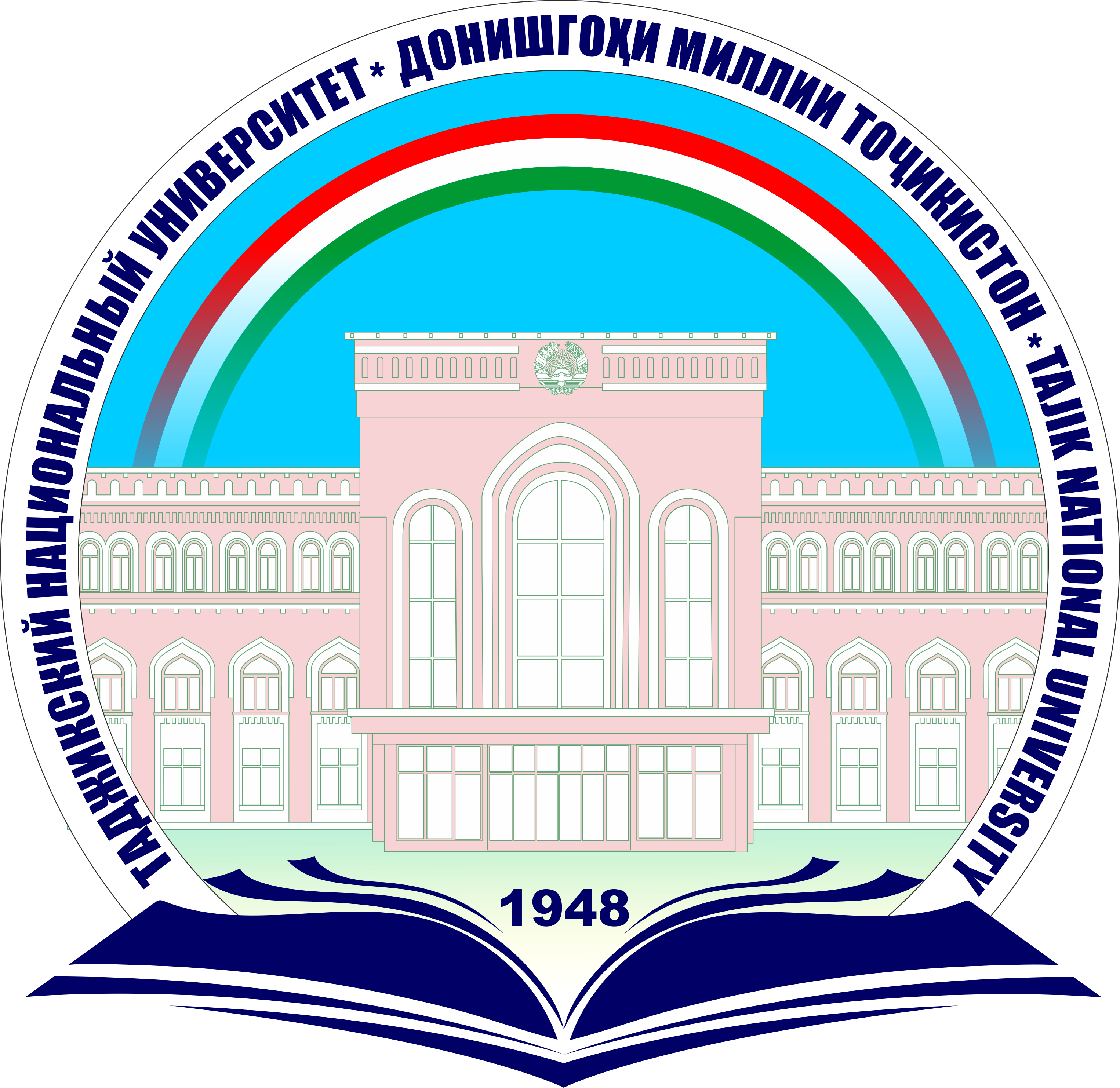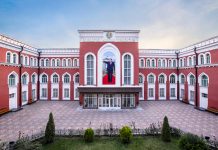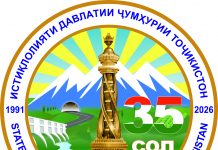Since the early days of gaining its state independence, the Republic of Tajikistan, based on the principles of the “open doors” policy, peacefulness and objectivity, established and subsequently extended and strengthened friendly, equal and mutually beneficial relations with most countries of the world, and with number of them established strategic partnership. One of the priorities of the international strategy of the Republic of Tajikistan is the policy of good-neighborliness and multilateral cooperation with the Central Asian states. The creation of an atmosphere of credibility and security along the entire perimeter of the country’s borders is one of the key goals of this policy.
Along with this, the foreign policy of our state aimed at ensuring wide-ranging and effective participation of the country in relevant international and regional organizations. Through the implementation of such policy, Tajikistan makes its feasible contribution to ensure security and peace, the establishment of beneficial international cooperation and constructive dialogue, and takes the advantage of the capabilities of international and regional organizations to enable the sustainable development of the country and strengthening its position in the international arena.
This year the Republic of Tajikistan celebrates the 30th Anniversary of State Independence. During this short period by historical standards, our republic has established full-fledged diplomatic relations with 179 countries of the world and has become an active member of prestigious international and regional organizations.
By establishing partnerships with the world community within the framework of international and regional organizations, the Republic of Tajikistan has expanded cooperation with the UN and its specialized agencies, SCO, CSTO, OSCE, ECO and OIC, as well as with other development partners, international and regional financial institutions.
In the framework of multilateral diplomacy, the Republic of Tajikistan pays particular attention to the development of fruitful relations within the framework of the Shanghai Cooperation Organization (hereinafter referred to as SCO / Organization). It is no coincidence that the current Foreign Policy Concept of the Republic of Tajikistan notes: “Active participation of the Republic of Tajikistan in the Shanghai Cooperation Organization aims to strengthen good-neighborly ties, friendly and amicable relations among the Member States and observers of the Organization, as well as ensuring security, stability and sustainable development in the region”.
Therefore the Republic of Tajikistan perceives priority areas of its activities within the framework of this Organization not only in the spheres of security and economic collaboration but also in the development and improvement of multilateral cooperation in the cultural and humanitarian fields.
Tajikistan also supports the involvement of observer states in the sphere of combating the contemporary challenges and threats within the SCO.
It should be highlighted that the SCO, the twentieth anniversary of which we are celebrating this year, has confirmed from the first day of its activity that it is a dynamic Organization and a reputable international institution not only in the region but also at the global level.
Over its twenty-year history, the SCO has turned into one of the most influential international organizations of a new type, into a unique regional structure that has repeatedly proved its universal character in resolving topical world issues. The course of events in the era of globalization has clearly shown to all political actors that no state alone is capable of effectively dealing with modern challenges and threats. Under such circumstances, only coordinated measures and joint efforts of all states can be effective.
A popular proverb says, “A friend in need is a friend indeed”. The SCO member states in the most difficult times of the outbreak of the COVID-19 pandemic have demonstrated their solidarity, provided effective support to each other on many problematic issues. The world has once again become convinced that the member states of the Organization are committed to the values and principles of the “Shanghai Spirit”.
The SCO has gone through a long process of formation to reach the current stage of development and become a powerful international organization. To establish the organization as such, it was essential to go through a period of fruitful and multifaceted cooperation.
Considering the development of the international situation and the surge in security threats in the region at the end of the 90’s of the last century, the “Shanghai Five” member states faced the crucial decision. It was necessary to agree on the creation of a new, improved organization as one of the most important tools to counter the new threats and challenges that are gaining strength.
Taking into account the real state of affairs, the Heads of State decided to initiate the foundation for creating a more complete structure based on the “Shanghai Five”, which could unite China, Russia and all the Central Asian countries into a single regional organization.
Considering the identified tasks an intergovernmental commission was established, which carried out immense consultative work.
On 25 August 1999, fourth summit of the “Shanghai Five” held in Bishkek. At this forum, it was decided to transfer the initiative to hold the Fifth summit of Heads of State to Tajikistan.
The presidency of the Republic of Tajikistan in the “Shanghai Five” lasted from September 1999 to July 2000.
During the presidency, we carried out comprehensive preparatory work on holding the summit of the “Shanghai Five”, to which the leadership of the Republic of Uzbekistan was invited.
The meeting of the Heads of the “Shanghai Five” countries, which took place on 5 July 2000 in Dushanbe, became a remarkable event of particular significance. The “Shanghai Five” was called the “Shanghai Forum” in Dushanbe. It was this Dushanbe decision that laid the foundation for the creation of the SCO.
Thus, a proposal to transform the “Shanghai Five” into a regional international organization, which is currently known as the Shanghai Cooperation Organization, introduced in Tajikistan. The Dushanbe Declaration of 2000 laid down the fundamental ideas about the goals, objectives and main directions of activities of the future prestigious regional international organization – SCO, which today has taken a worthy place in world political reality.
Later, on 15 June 2001, a meeting of Heads of State took place in Shanghai during which a Joint Declaration on the Republic of Uzbekistan’s accession to the “Shanghai Five” was adopted, and a Declaration on the establishment of the SCO was signed based on the accumulated experience within the “Shanghai Five”.
As humanity entered the new century, the world has witnessed the emergence of a powerful international structure.
One of the important steps in the formation and development of the SCO was the meeting of the Council of Heads of State in 2005: it took a fundamental decision to grant observer status within the Organization to three major Asian powers – India, Iran and Pakistan. Earlier in 2004, status was granted to Mongolia. The geographical expansion of the Organization made it possible to rise its international significance.
Later in 2007, the SCO countries signed an Agreement on Long-Term Good Neighborliness, Friendship and Cooperation.
In 2009, a decision was taken to grant the status of a dialogue partner to Sri Lanka and Belarus.
In 2012, the SCO leaders adopted a Declaration on Building a Region of Long-Term Peace and Shared Prosperity. In the same year, Afghanistan gained observer status in the SCO, and Turkey became a dialogue partner.
In 2014, India and Pakistan officially applied for the SCO membership. This coincided with Tajikistan’s chairmanship in the SCO in 2013-2014. This period gave a new impetus to the procedure for considering the issue of granting the status of the SCO Member State. The Summit of the Heads of State of the Member States in Dushanbe laid a solid foundation for the elaboration of a legal basis for the procedure for granting the status of the SCO Member State. This procedure was further discussed and finalized at the next Summit of Heads of State.
In 2015, the leaders of the SCO countries approved a decision to commence the procedures for admitting India and Pakistan to membership in the Organization, and resolutions were also signed on granting Belarus an observer status at the SCO, as well as on granting the status of a dialogue partner to Azerbaijan, Armenia, Cambodia and Nepal. Thus, the SCO has promptly evolved from a standard regional organization into a large international organization. Such a rapid expansion of the Organization over just two decades, both in structure and in the variety of activities, demonstrates precision in determining the goals and good intentions of the SCO.
This process produced its first results at the Summit of the Shanghai Cooperation Organization in Astana in June 2017. The two largest countries in the region, India and Pakistan, have obtained the status of member states of the Organization.
It is noteworthy that, according to the fair opinion of most experts, such organizations in the contemporary world are the essential organizers of interstate communication to facilitate the solution of international issues. Since the very beginning of the SCO establishment, the entities were set up to meet the demands of modern realities. For instance, the SCO Secretariat and the Executive Committee of SCO Regional Anti-Terrorist Structure (RATS), which have been operating since January 2004, were identified as permanent bodies or structures based on mutual agreement of the parties. Beijing city was determined as the venue of the SCO Secretariat, while Tashkent city was the venue of the SCO Executive Committee.
Generally, analyzing the overall arrangements of the SCO establishment and all phases of its development it should be emphasized that many political, historical and economic factors led to the emergence of the Organization in the political space of Eurasia, the most important of which are:
– destruction of the bipolar system in international relations;
– formation of a new world order as a result of the collapse of the former USSR;
– rise of new challenges and threats, among of which terrorism, extremism and separatism were the most dangerous phenomena;
– realization of the principles of a just world order, dominated by the aspiration for joint development, taking into account the experience of relations that have developed among the countries of the region within the framework of the “Shanghai Five”;
– joint pursuit for new effective mechanisms that would enhance the regional integration of countries;
– formation of a new model of cooperation in the region, where the priority areas are security, economic interaction and cooperation in all areas.
In fact, in the years when the SCO was founded, significant changes took place in the world that completely altered the content and vectors of world politics. In this regard, the countries that initiated the establishment of this Organization had to adapt it to new world realities, to fast-paced conditions and seek a worthy place for it in the world political arena. The new conditions required the newly formed regional international organization – SCO, to operate differently, more actively contribute to the solution of topical regional problems.
The question arose in this way: the Organization must have the capability and ability to meet the interests of the member states, to carry out economic, trade, cultural and humanitarian integration in complicated international circumstances.
The further activities of the SCO proved that the Organization not only succeeded in starting to address these issues but also to become a structure that occupies strong positions in the international political arena.
The SCO’s activities are focused, which is very important, not only on political issues but also on economic ties. Within the framework of the Organization, the long-term economic cooperation plans have been approved by the member states, the purpose of which is to facilitate the free movement of goods, services and technologies among all member states. The interaction of countries in the fight against crime, in the spheres of culture and education, science and innovative technologies, as well as in such areas as health care and the agro-industrial complex is also gaining strength.
Twenty years of the SCO’s activity confirms that this Organization is reputable and influential platform for discussing and solving pressing regional and international issues.
Accordingly, Tajikistan is involved in its activities, including in the Program of Multilateral Trade and Economic Cooperation of the SCO Member States and interacts in the implementation of various projects and in other areas.
Over twenty years of its activity in the field of international politics, the SCO has been a hallmark of an effective organization and has won great authority in the fast-growing world. Its recognition as an observer in the UN General Assembly as well as effective cooperation with the Commonwealth of Independent States and ASEAN testifies to the growing status of the Organization in world politics.
On the other hand, further progress and expansion of the SCO depend on many regional and international factors. This is, primarily, the geopolitical situation in the world, cooperation in matters of regional security and trade and economic development.
It would be appropriate to state that the role of the Republic of Tajikistan, as one of the founders of the SCO, is essential in the process of formation and development of the Organization.
Tajikistan chaired the Council of Heads of State in 2008 and 2014, and the Council of Heads of Government of the SCO member states in 2006, 2010 and 2018.
We will expand our activities within the framework of the Organization and strengthen our relations with its members, continue our joint activities within the SCO in the field of countering modern challenges and threats, in particular, terrorism, extremism, illicit drug trafficking and other manifestations of transnational organized crime.
Tajikistan believes that the SCO member states should not only preserve the traditions of good-neighborliness, but also find new optimal ways to solve existing or emerging problems of a socio-economic nature.
To date, our countries have achieved positive results in all these areas. However, in a rapidly changing world, we should not stop there, but move forward and solve topical issues of a political, economic and social nature. Together we should strive to ensure security in the region and the peaceful coexistence of all countries of the world.
In 2020, the presidency of the Organization handed by the Russian Federation to the Republic of Tajikistan. Accordingly, the Jubilee Summit of the Heads of the SCO States will be held in Dushanbe on 16-17 September 2021. This is very significant since the initial decision to establish the SCO was taken in the capital of our country.
We are confident that after celebrating its anniversary, the SCO will continue to be an active structure, an effective platform for exchanging views, developing common positions and agreeing on various points of view, and will also improve its policy following the demands of the times.
The SCO’s activities fully comply with the basic principles of the foreign policy strategy of our state. We are interested in further strengthening its role in solving the key tasks of strengthening peace and security, expanding trade, economic, cultural and humanitarian ties.
In conclusion, I would like to note that from the very beginning of its foundation, The SCO has been striving to establish fair international relations. Twenty years of the Shanghai Cooperation Organization’s activity, which coincided with a very difficult period in international relations, have shown that the Organization has become a real force in the arena of global politics. The SCO member states have achieved a high degree of cooperation and trust in resolving the issues of policy, economy and security. Annual meetings at different levels not only provide an opportunity to a timely solution of urgent problems, but also provide quick responses in the rapidly changing world. All these indicate that the Shanghai Cooperation Organisation, at the origin of which was also our State, is indeed a very promising structure both in the regional and the global scale.









